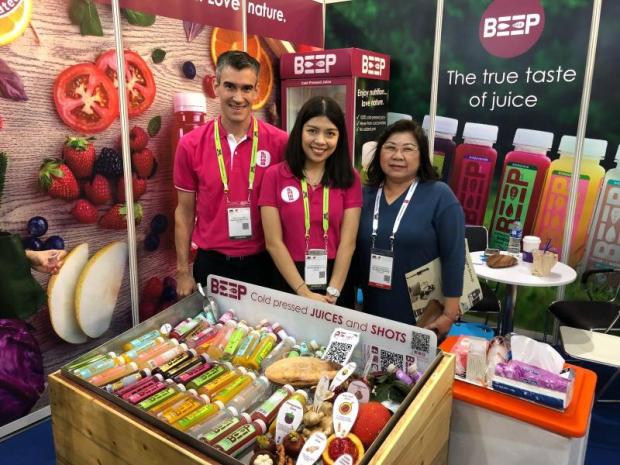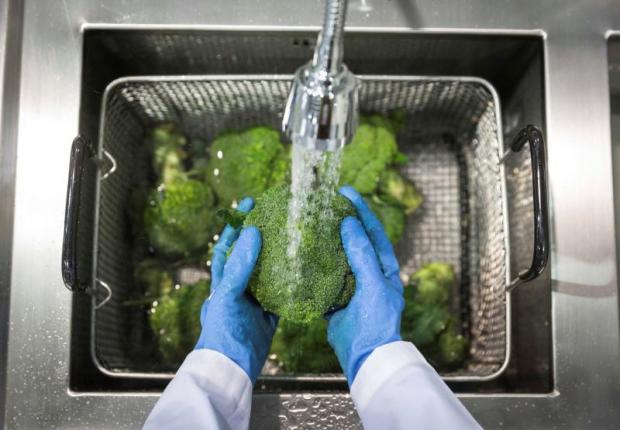
Fresher Kitchen Co, the maker of fresh cold-pressed juice brand BEEP, aims to consolidate the fragmented high-end fruit juice market by introducing a longer shelf life and replicating the techniques of small-batch natural fruit juice sellers on an industrial scale.
The Thai mass-market juice space is dominated by big corporations like Coca-Cola and Tipco. But the high-end segment is made up of thousands of individual stalls squeezing juice on the spot and a few mid-sized players like Make it Happen and Fresher, which still command single-digit market shares.
There are few barriers to entry in the juice-pressing business, aside from a moderate initial machinery investment. Moreover, differentiating products can be hard because everyone is pressing more or less the same fruits, leading to commoditisation of the market.

Fresher Kitchen co-founder Jamie Rowland-Jones helped showcase BEEP products at the FHA 2018 event in Singapore last month.
Fresher Kitchen is betting that reproducing these traditional juice-making processes on an industrial scale can help reduce costs while improving hygiene and standardising quality. This model has already been implemented elsewhere with success.
Suja Juice, a California-based organic and cold-pressed juice company, grew from a few batches of homemade juice to more than 10% of the US$500 million (16 billion baht) market after a strategic alliance with Coca-Cola allowed it to streamline its production processes and expand its distribution networks.
For years the growth of cold-pressed juices was capped by their inability to make it to the shelves of big retailers. Natural juice has an average shelf life of three days, more than 10 times less than the minimum 30 days required by most large stores.
Producers had been unwilling to use pasteurisation, a standard process to kill bacteria in food, because they were afraid it would also kill the flavours and nutrients in natural juice.
High-pressure processing (HPP), which allows producers to extend a juice's shelf life to over 40 days by eliminating pathogens without compromising flavour or nutritional value, has been a key ingredient in both Suja's and Fresher's expansion strategy.
HPP, long used in products like shrimp and lobster, was pioneered in the context of cold-pressed juice by Suja and Evolution Fresh (distributed through Starbucks) two years ago, but no Thai juice brand uses the process at present, said Jamie Rowland-Jones, co-founder of Fresher Kitchen.
The shelf life for Make it Happen, one of Fresher's largest competitors in Thailand, is still 3-5 days, according to its website.

Fresh fruits and vegetables undergo cleaning with ultrasonic and ozone treatment before being cold-pressed and treated with high pressure to provide a shelf life of up to 45 days.
Fresher sells 30,000 bottles a month, or 36 million baht a year (assuming an average price of 100 baht), which computes to roughly 1% of the 5-billion-baht premium juice market. The company doesn't have a sales target for this year, but it's looking for growth abroad, especially in the Singaporean market where it made an entry earlier this year.
Premium juice comprises about 30% of Thailand's 14-billion-baht juice market, according to SET-listed juice maker Tipco Foods Thailand. There is no exact estimate for the cold-pressed juice market, a sub-segment of the premium market, but Mr Rowland-Jones said it remains a niche product.
Price is a key barrier for most consumers. BEEP juices retail for 75-155 baht per 250 ml (depending on the ingredients used), in line with the prices of other cold-pressed makers, but far above the 10-30 baht per serving for most pasteurised juices. Most of Make it Happen's juices retail for 120 baht per 290ml bottle. In the US, Suja Juice can retail for more than $10 each.
Juice companies have said it's nearly impossible to lower prices given the high prices of fruit, contending it would cost consumers the same or more to prepare the juices at home.
Mr Rowland-Jones said a price change is not in the cards, but the company is expanding its distribution channels from restaurants and high-end grocery stores like Tops Supermarket and Gourmet Market to universities and fitness centres.
The cold-pressed juice market has been growing at an impressive clip over the last three years, as increasingly health-conscious consumers curb their consumption of sodas and other sugary drinks. Drinks giants PepsiCo and Coca-Cola have not been passive observers of the trend.
Coca-Cola snapped up a 30% share of Suja Juice for $90 million in 2015, valuing the company at close to $300 million -- a 7.14 sales-to-equity ratio on $42 million in sales. Investment bank Goldman Sachs acquired an additional 20% stake for $60 million.
Sales of cold-pressed juice have been driven by "juice cleanses" -- juice-only diets that require users to purchase six or more meal replacement juices a day, sometimes for hundreds of dollars. Suja Juice itself, now the largest cold-pressed juice maker by market share in the US, started by selling $225 three-day juice supplies.
The appeal of cold-pressed juices has been steadily expanding after leaving the confines of specialty stores. Just like a cup of Starbucks coffee, juices have become a status symbol of the health-conscious and affluent, boding well for their expansion in Thailand and other developing markets.